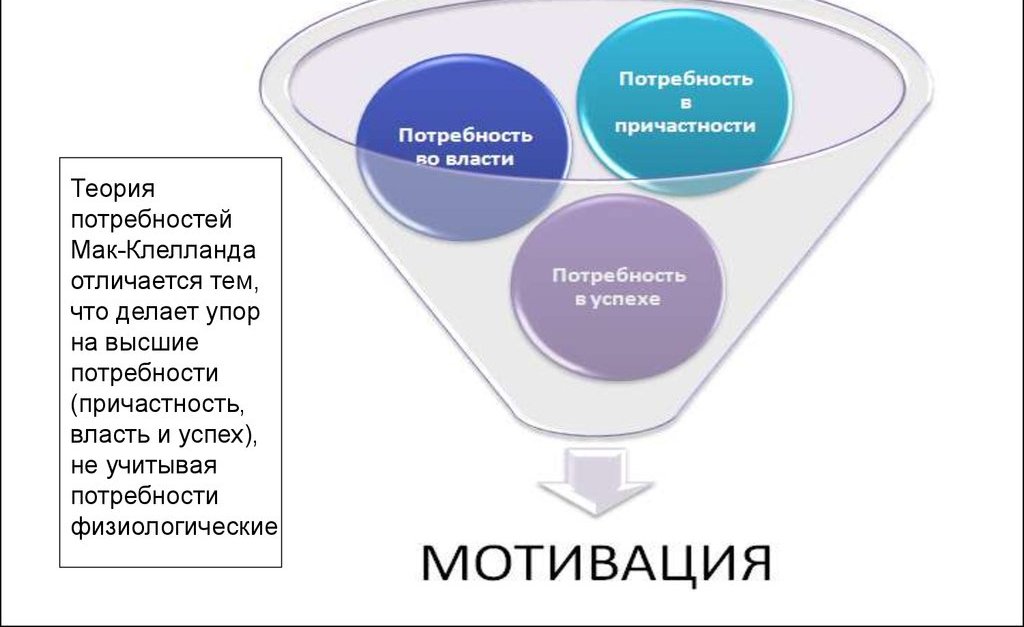David McClelland once stated that we all have three types of motivation, regardless of age, gender, race or culture. The dominant type of motivation stems from life experience and cultural context. This theory is often studied in schools and faculties specializing in teaching the basics of management or organization of processes.
Need for achievement
According to David McClelland’s theory, the need for achievement relates to a person’s desire to achieve significant success, mastery of skills, and the desire for high standards. The term itself was first used by Henry Murray and is associated with a number of actions that a person performs in a given situation. These include intense, prolonged, and repeated efforts to achieve something difficult. The concept of need for achievement was subsequently popularized by psychologist David McClelland.
Desire for more
The character trait or necessity, which was described above, is characterized by steady and consistent concern for the establishment and achievement of high standards in any field of activity. This need depends on the inner desire for action (intrinsic motivation) and the pressure created by the expectations of others (extrinsic motivation). Measured using the Thematic Apperception Test (TAT), the need for achievement motivates a person to succeed in competition and excel in matters of importance to him. According to David McClelland, the motivation of a person is very strongly tied to this desire.

The need for achievements is associated with the difficulty of tasks that people solve every day. Those with a low level of this parameter can choose very simple tasks to minimize the risk of failure, or, conversely, very difficult ones to shift all responsibility to imaginary difficulties (self-sabotage). Those who have this parameter at a high level, as a rule, choose moderately difficult tasks, feeling that they are really difficult, but quite solvable. So says David McClelland's theory of motivation.
Recruiting and possible difficulties
Usually among the employees of a company or organization it is difficult to find those who have a high need for achievements and at the same time do not make any efforts to realize this very need. According to the same theory of needs of David McClelland, these people are usually immediately visible, since they stand out from the rest with their initiative and enthusiasm. If these people do not receive satisfaction of their needs in the form of recognition, they may become dissatisfied and disappointed with their work or position. This can lead to many problems at work, up to a total drop in initiative and, as a result, disability. The theory of David McClelland's acquired needs is useful in that it helps employers avoid such problems.

To bite the vanity of ambitious employees is more expensive. This can bring great troubles to the authorities. Thanks to the book by David McClelland, it became known that the need for achievement can manifest itself in different ways. A person will either perform small easy tasks that he knows he can perform and get recognition for this or will take on extremely difficult tasks because he needs to raise the bar of his achievements each time. It was found that employees motivated by the need for achievement, as a rule, are more prone to risky enterprises. According to David McClelland, they also like to experiment with new technologies. These people, as a rule, are very zealous in their work. That is why they require maximum external recognition when they complete their tasks.
Advice to employers
If such people do not receive recognition, then they usually go two ways. Such an employee can continue to work and take on more responsibility, be creative and try to impress and gain recognition, and then his need will be satisfied sooner or later. Or he will simply quit to find a job in which he will be truly appreciated. Therefore, employers, managers, colleagues and employees must respect all employees who need achievements and motivate them, because they are first-class employees. This, according to David McClelland's “Human Motivation,” will lead to a productive, happy, and well-established team.
Need discovery
The research of McClelland and his colleagues on achievement motivation is particularly relevant to the art of leadership and management. David McClelland was interested in the possibility of deliberately awakening motivation in order to find out how people express their preferences for specific results, which is a common problem of the phenomenon of motivation. In the course of these studies, the need for achievements was discovered.
The procedure in McClelland's initial study was to arouse concern among the audience about the achievements of each of its representatives. During this experiment, the psychologist discovered, analyzing the test results, that each of the subjects had a completely different level of this need. Using results based on the thematic aperceptive test, McClelland demonstrated that individuals in society can be divided into two types: those who have a high need for achievement, and those who have a low need for it.
Further research
Since then, David McClelland and his associates have expanded their work in the field of needs analysis, incorporating in their research the individual abilities and requirements of various age and professional groups, as well as nationalities. These studies have shown that the level of need for achievements increases with the growth of a professional level. The highest level is demonstrated by entrepreneurs and top managers. Other studies of the characteristics of dignitaries have shown that achievement at work is an end in itself. Cash rewards are only an indicator of this achievement. In addition, these studies have shown that people with high emotional intelligence have a high need for achievement, while people with low emotional intelligence have an underestimated need. The latter will take risks only when their personal contribution will matter for the final result of the activity. David McClelland is the author of the theory of motivation, and in this matter he can be trusted.
Need for accessories
It is time to move on to the second point of the theory. The need for affiliation is a term that David McClelland popularized and describes a person’s desire to feel complicity and ownership of a social group.

The ideas of McClelland were greatly influenced by the innovative work of Henry Murray, which for the first time in history identified the basic psychological needs of a person and motivational processes. It was Murray who laid out the taxonomy of needs, among which were achievement, power, and belonging, and placed them in the context of an integrated motivational model. People with a high need for affiliation require warm interpersonal relationships and approval from those with whom they have regular contact. Having a strong connection with others makes a person feel as if he is part of something important, which creates a strong impact on the whole team. People who pay great attention to a sense of belonging tend to support team members, but may be less effective in leadership positions. A person who takes part in a group - whether it be a movement or a project, creates an atmosphere of solidarity and brotherhood in the team.
Need for power
The need for power is a term that was popularized by the famous psychologist David Macklelland in 1961. As mentioned earlier, McClelland was inspired by Murray's research and continued to develop the theory of the latter, focusing on its application to the human population. McClelland’s book, “Achievable Society,” says that the will to power helps explain the urges of individuals to take responsibility. According to his work, there are two types of power: social and personal.
Definition
McClelland defines the need for power as the desire to control other people in order to achieve their own goals and to realize certain ideas (for example, the idea of a “common good”), and describes people who require the rest not to recognize and not to belong, but only loyalty and obedience. In his later studies, McClelland refined his theory to include two different types of power motivation: the need for socialized power, expressed in the so-called planned thinking - self-doubt and concern for others, and the need for personal power, expressed in thirst for struggle and sole control over others.
Differences from the rest
Compared to people who value affiliation or achievement, people with high levels of will to power are generally more knowledgeable in disputes, more assertive in group discussions, and most likely frustrated when they feel powerless or out of control. They are more likely to seek or hold the position in which they have the ability to control the actions of others.
Global context
McCleland's studies showed that 86% of the population is dominated by one, two, or all three types of motivation. His subsequent research, published in a 1977 Harvard Business Review article, “Power Is a Great Motivator,” showed that those in leadership positions had a high need for power and a low need for affiliation. His research also showed that people with a high need for achievement will work best if they are provided with projects in which they can succeed on their own. Although people with a strong need for achievement can be successful lower-level managers, they are usually cut off from the possibility of reaching senior management positions. The psychologist also found that people with a high need for belonging may not be the best top managers, but at the same time they are making great strides as ordinary workers. In short, David McClelland's theory has shown how individual differences in motivation affect the production and activities of any workforce.